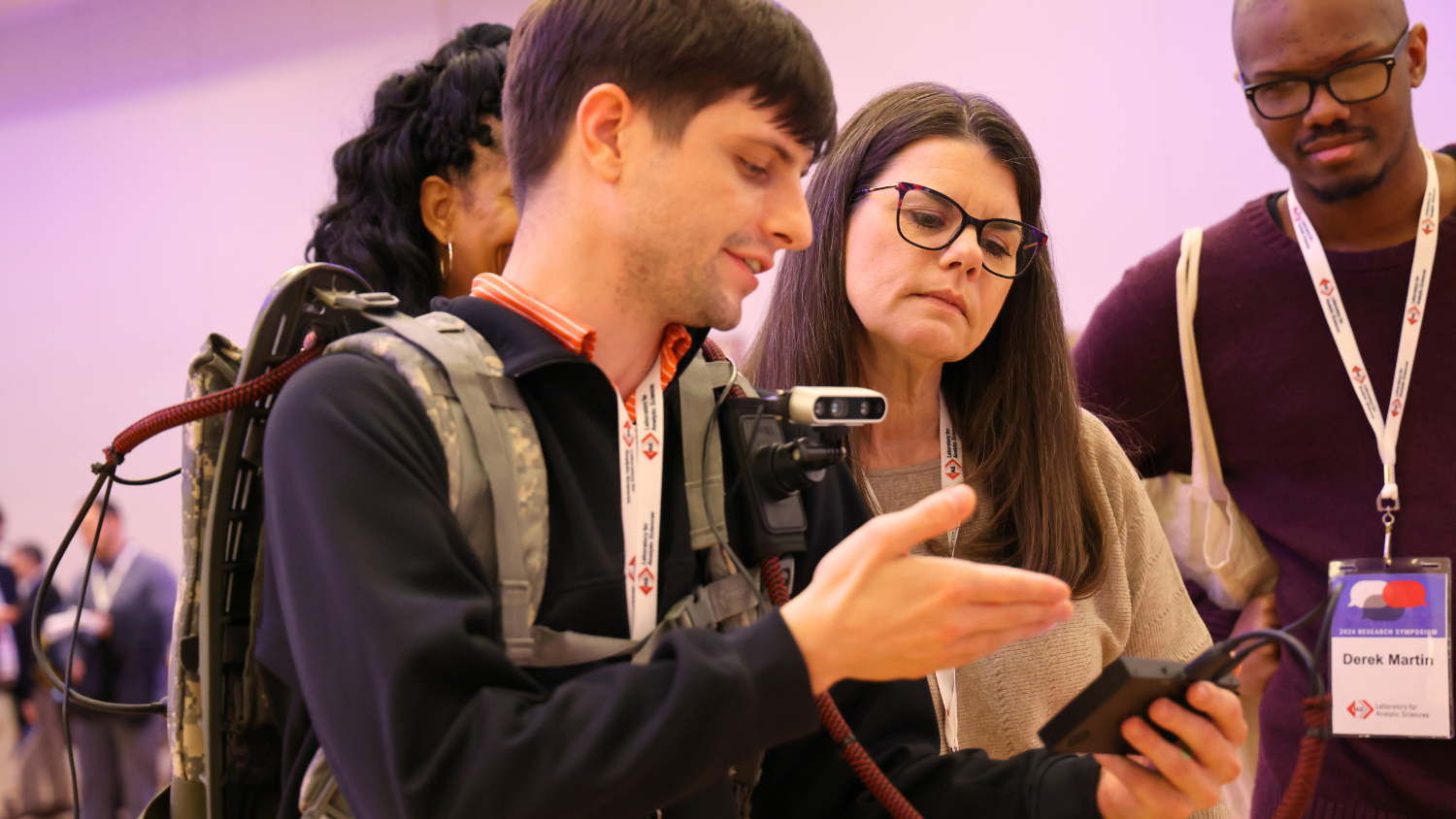Laboratory for Analytic Sciences Hosts 10th Research Symposium for Intelligence Analysis
The event brought together academic, industry and government collaborators to explore the latest technologies.

Deploy, test, refine. That’s an oft-heard phrase at NC State’s Laboratory for Analytic Sciences annual research symposium, where more than 200 attendees from government, industry and academia gathered on December 3 to see the latest technologies developed to improve intelligence analysis. It was the 10th symposium since the lab known as LAS began in 2013.
Talley Student Union was vibrant with students focused on the last day of classes, while LAS collaborators showed visitors from the U.S. Department of Defense how their recent work could alleviate real-world challenges faced by the intelligence community. Researchers presented lightning talks summarizing this year’s 34 projects, followed by poster sessions during which attendees could test out prototypes and confer with researchers.
This year, the lab’s research revolved around three themes:
- Content triage projects demonstrate ways to address mission challenges around the need to process and exploit large data volumes, like video, images, audio and text.
- Human-machine teaming projects demonstrate ways to address mission challenges around the need to enhance the effectiveness of human analysts partnering with automated technology.
- Operationalizing artificial intelligence (AI) and machine learning (ML) projects demonstrate ways to address mission challenges around the need for AI and ML to be useful even when working under operational environment constraints — whether they be financial, time, or cognitive resources.
Effective intelligence analysis is directly impacted by the ability of an analyst to process and make sense of large amounts of complex data, says LAS director Jacqueline Selig-Gumtow. As a career employee of the Department of Defense, she has seen how technological advancements in data science, AI and machine learning have the potential to help people get through vast amounts of data, but says many breakthroughs are happening with tremendous speed outside of the intelligence community.
The government’s partnership with NC State allows analysts to work with academia and industry to research, develop, and communicate practical solutions to these challenges.
LAS research projects focus on addressing challenges faced by intelligence analysts, but these are also challenges increasingly faced by everyone.
“We are all thinking about how AI and machine learning can help us deal with the massive amounts of information available to us,” says Matthew Schmidt, principal investigator of LAS.
“We are all concerned with figuring out how to make sure that the technology serves our workflows and not the other way around. And we all want to make sure its use doesn’t lead to unexpected vulnerabilities or negative outcomes for the people and organizations that use it.”
In 2024, LAS executed funding from the Department of Defense to six companies and 11 academic institutions, with 22 faculty participants from institutions. Each LAS principal investigator fully funds at least one graduate or undergraduate research student, with an average of 20 graduate students fully funded by LAS at NC State each year.
One notable project from this year, ECHOLAB, explored how AI-powered tools could improve speech-to-text transcription for intelligence analysts.
Kanv Khare, a computer science graduate student at NC State, started working on the ECHOLAB project through LAS’s collaboration with the university’s Senior Design Center last year. After the semester-long project ended, he stayed involved this year through an internship with LAS.
“There’s a lot of audio data out there, most of which is poor quality, like from a microphone in a war zone,” says Khare. “Being able to transcribe it so you can then perform a text search to find relevant information could be very helpful for gathering intel.”
Initially, the tool didn’t work – the audio transcriptions were worse. The team refined how they prompted the AI and created a selection model to review the transcription – which improved. By integrating human translations into large language models, the team reduced transcription errors by up to half, making extracting accurate insights from complex audio data easier.
The freedom and flexibility to come up with ideas and try them in the ECHOLAB project appealed to Khare.
“I love the problem-solving aspect,” he says. “It’s one of the reasons I decided to continue working with LAS. Working with people in government, there’s a sense of community and service. Everyone believes in the project, so they’re involved. It’s fun to work with people who want the project to succeed.”
About LAS
The Laboratory for Analytic Sciences is a partnership between the intelligence community and North Carolina State University that develops innovative technology and tradecraft to help solve mission-relevant problems.
Founded in 2013 by the National Security Agency and NC State, each year LAS brings together collaborators from three sectors – industry, academia and government – to conduct research that has a direct impact on national security.
- Categories:



